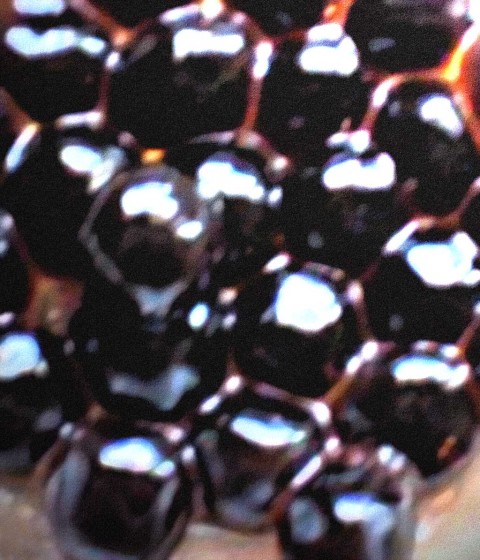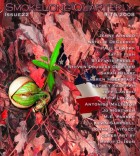Her father stared at her from across the unusually long kitchen table. He held his fork half way to his mouth, eggs already fallen back to his plate, just an empty fork fixed in its space, like a computer frozen on the blue screen of death that sends you ctrl-alt-deleting, petrified.
“What do you mean?”
His little girl poked away at breakfast. In the act of buttering her toast, she didn’t look up to see the shock on his face. “Oh, you know, dad. The colors of the words. I just mean that it’s funny for ‘orange’ to be a pale yellow word when oranges are so…orange!” Elena’s eyes lifted to meet his. “What’s wrong, Dad?” “Elena…” he relaxed his body but the wrinkles in his temples remained. “Words don’t have colors. They’re just letters pushed together to create meaning. They’re just…words.”
The girl was astonished, mostly confused. She must have done something wrong. “But they do have colors…” Ever since Elena was beginning to learn how to spell, ever word had a different color. Not just words, but every letter and number too. She’d never spoke about it before. That’s just the way they were. She thought everyone knew about the colors. Elena told her father everything in excruciating detail. She struggled to explain how A to Z looked. Some letters were easy, like ‘B.’ “Solid green,” she’d said. “Like grass in the summer.” But other’s proved to bother her when she couldn’t quite label them. “O is somewhere in between black and brown. With glints of light coming off of it. I really don’t want to talk anymore,” but her father insisted that she keep going. She told him about the numbers, and how in order to find them in her mind she pulled them from a colorful downward spiral where the values got larger and larger as she spiraled down. “Why not just a black and white number line, with zero in the middle?” She tried to concentrate on a straight black line. The process frustrated her. “That’s so much harder to think about, Dad.” He jotted notes, his hand wearily gliding over the paper, and his temples still worried.
“What color is ‘banana’?”
“Well, green, because ‘B’ is green. But a lighter shade, and with more grey in it.”
“And ‘mule’?”
“Deep red, like blood.”
“I want you to promise me something.”
“Sure, Dad.”
“Don’t mention the colors or glints of light, or the number spiral to anyone.”
So the issue went back into its cage for seven years. Dad was convinced something was wrong with his daughter. If anyone found out, they would never take Elena seriously, or himself, for that matter. But locking the cage never killed the bird.
One day, while fifteen-year-old Elena was browsing the magazines at a local drugstore, a headline caught her eye. She didn’t even realize the meaning of the words at first. The only thing she noticed was that every letter of the headline was printed in a different rainbow color, and the colors were completely wrong. Picking up the magazine, she focused very hard to cipher out the words. It was like reading a different language, or rather, a language of symbols that she was able to pronounce but held no meaning until she translated the sounds back into letters. She stared at the print and translated every shape she saw into the color she defined it with. Only then did the shapes become letters and the words become meaningful. “Synesthesia: Redefining Color.” The article, which fortunately was written in a leisurely black, defined synesthesia as “a neurological condition in which two or more bodily senses are coupled.” In the article, Elena read the stories of people just like her. She read stories of people who reported synesthetic connections even stranger than her own, like a woman who colored music and personified numbers, and a man who tasted shapes. Suddenly, everything her father had told her on that disquieting Sunday morning came crashing down. It was as if the unsettled confusion that she’d felt for years was finally breaking, clearing the mist in her mind like a light in the fog. She wasn’t alone. Not even nearly alone. The article included a list of famous people who’d been known to have this condition. Great composers Leonard Bernstein, Joachim Raff, Sibelius, Liszt, and Messiaen. Writer Vladimir Nabokov, not to mention his wife as well as their son, Dmitri. Even Duke Ellington, one of her heroes, appeared on the list. Elena paid for the magazine and rushed home to set things straight with her father.
“Here.” She handed the magazine to her father. “Read it. I’m not grotesque or defective.” He read the headline and slammed it down on the table. She saw his shoulders tense up. She noticed that the worried folds that once occupied his forehead weren’t there this time. No empathy and no interest. Just choleric impatience.
“The color of ‘O.’ I figured out how to describe it. It looks like tapioca balls. Sheer and glazed, almost translucent, but extremely dark and tinted.”
“I told you to never bring this up. I don’t want to hear about it ever again.” She let out a sigh because there was nothing left to say. That’s okay, Dad. You won’t.
The time was 8:15 on Sunday morning, and Dad watched his daughter walk out the door.



 The core workshop of SmokeLong Fitness is all in writing, so you can take part from anywhere at anytime. We are excited about creating a supportive, consistent and structured environment for flash writers to work on their craft in a community. We are thrilled and proud to say that our workshop participants have won, placed, or been listed in every major flash competition. Community works.
The core workshop of SmokeLong Fitness is all in writing, so you can take part from anywhere at anytime. We are excited about creating a supportive, consistent and structured environment for flash writers to work on their craft in a community. We are thrilled and proud to say that our workshop participants have won, placed, or been listed in every major flash competition. Community works.